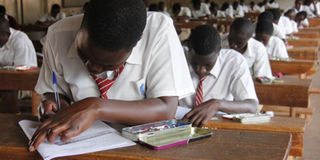Enhancing performance in UPE schools

Pupils sit their Primary Leaving Examinations last year. FILE PHOTO
In 1997, government introduced Universal Primary Education (UPE) as one of Uganda’s main policy tools for achieving poverty eradication and human development.
According to the 2006 Policy brief 10, its main objectives were, to provide the facilities and resources to enable every child to start and remain in school until the primary cycle of education is complete, to make education equitable in order to eliminate disparities and inequalities, to ensure that education is affordable by the majority of Ugandans and to reduce poverty by equipping every individual with basic skills.
Under this programme, the government abolished all tuition fees and Parents and Teachers Association charges for primary education.
Though this was a big relief to many parents who were finding challenges with paying school fees for their children, 20 years after the programmes was incepted, a number of school heads especially those in rural schools claim that the programme has contributed a lot to the dismal performance that has come to be associated with the schools.
Among the reasons majority head teachers give for this is that parents are not playing their role and are acting like they are not obliged to do anything to support their children’s learning.
According to Rebecca Lucy Akello, a head teacher Bweyale Public School, ever since UPE was introduced, some parents in rural areas have a tendency of sending their children without providing them with any scholastic materials.
“Many are the times we have received pupils without books, pencils and pens at school. Some come on an empty stomach and spend the whole day yawning, how do you expect these pupils to perform?” she asked.
To Akello, despite government paying the fees; parents still have a role to play.
Playing roles
Similarly, Badru Ssembajjwe Senoga, the head teacher of Kibuli Demonstration School, believes that good results in UPE schools can be attained if all stakeholders effectively played their role. He says the stakeholders include the parents, teachers, the community, pupils and the government.
“There is no way pupils can fail to perform if everyone is playing their part well. If the teachers are in class at the right time and the parents are playing their part well, there is no way UPE schools will fail to perform well,” he says.
There are some parents that believe that in order for the programme to succeed, parents also have to actively participate so as to motivate the teachers.
Sarah Nambatya, a parent, says in as much as the programme is entirely free, it may not be possible for the government to provide everything which might affect the quality of education.
“As a parent, it is your responsibility to make sure your child has something to eat while at school, it is also your responsibility to make sure the child has all the school requirements, do not expect government to buy books for your child,” she says.
John Tinka Byaruhanga, the head teacher Buhinga Primary School, says when parents are willing to support all the school programmes then children in UPE schools will perform just like those in private schools or even better.
“I head a UPE school but it is among the best performing in the district. Our parents are always willing to support all the school programmes and this has helped us to move swiftly,” he notes.
He explains that in addition to the termly exams, parents are always willing to sponsor more sets of exams from external districts such that by the time a child sits PLE, they are well prepared and ready to compete favourably at the national level.
Laxity to blame
However, according to Fagil Mandy, an educationist, the failure of parents to play their role in UPE schools virtually has nothing to do with the grades.
He observes that there is laxity on the side of ministry of Education in terms of inspection, one of the reasons why there is deteriorating performance in most UPE schools.
“There is so much absenteeism among teachers in UPE schools, the ministry needs to give penalties to the culprits such that the vice is stopped. Also the ministry has to take action on non-performing schools,” he says.
He says before teachers start shifting the blame to the parents, there are so many gaps that need to be filled on the part of the technical staff.




